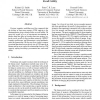Free Online Productivity Tools
i2Speak
i2Symbol
i2OCR
iTex2Img
iWeb2Print
iWeb2Shot
i2Type
iPdf2Split
iPdf2Merge
i2Bopomofo
i2Arabic
i2Style
i2Image
i2PDF
iLatex2Rtf
Sci2ools
EMS
2008
IEEE
2008
IEEE
Modelling the Relationship between Visual Short-Term Memory Capacity and Recall Ability
Previous cognitive modelling work has suggested that the decline of short-term memory (STM) capacity is the dominant factor of age-related decline on recall ability. We report the results of a set of experiments investigating in further detail the effect of varying short-term memory capacity on the recall of chess positions using the CHREST cognitive architecture, and demonstrate a good qualitative match for human data. We then use these results to suggest a potential functional reason for the size of STM capacity in humans and go on to explore the relationships between STM capacity, ageing, knowledge, presentation time, and recall ability.
| Added | 29 May 2010 |
| Updated | 29 May 2010 |
| Type | Conference |
| Year | 2008 |
| Where | EMS |
| Authors | Richard Ll. Smith, Peter C. R. Lane, Fernand Gobet |
Comments (0)

